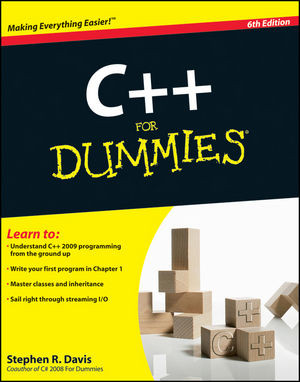

Most ebook files are in PDF format, so you can easily read them using various software such as Foxit Reader or directly on the Google Chrome browser.
Some ebook files are released by publishers in other formats such as .awz, .mobi, .epub, .fb2, etc. You may need to install specific software to read these formats on mobile/PC, such as Calibre.
Please read the tutorial at this link. https://ebooknice.com/page/post?id=faq
We offer FREE conversion to the popular formats you request; however, this may take some time. Therefore, right after payment, please email us, and we will try to provide the service as quickly as possible.
For some exceptional file formats or broken links (if any), please refrain from opening any disputes. Instead, email us first, and we will try to assist within a maximum of 6 hours.
EbookNice Team

Status:
Available5.0
30 reviewsC++ For Dummies, 6th Edition, helps you understand C++ programming from the ground up. It’s full of examples to show you how things work, and it even explains “why”, so you understand how the pieces fit together. And the bonus CD includes a special code editor, an update GNU compiler, and all source code from the book to save you time.
You’ll discover ten ways to avoid adding bugs to your programs, what pointers are and how to use them, how to work with strings, and some advanced features new to C++. C++ For Dummies, 6th Edition gets you up and running with this popular object-oriented language.
Note: CD-ROM/DVD and other supplementary materials are not included as part of eBook file.Content:
Chapter 1 Writing Your First C++ Program (pages 7–24):
Chapter 2 Declaring Variables Constantly (pages 25–39):
Chapter 3 Performing Mathematical Operations (pages 41–47):
Chapter 4 Performing Logical Operations (pages 49–62):
Chapter 5 Controlling Program Flow (pages 63–78):
Chapter 6 Creating Functions (pages 79–93):
Chapter 7 Storing Sequences in Arrays (pages 95–110):
Chapter 8 Taking a First Look at C++ Pointers (pages 111–125):
Chapter 9 Taking a Second Look at C++ Pointers (pages 127–143):
Chapter 10 The C++ Preprocessor (pages 145–158):
Chapter 11 Examining Object?Oriented Programming (pages 159–164):
Chapter 12 Adding Class to C++ (pages 165–179):
Chapter 13 Point and Stare at Objects (pages 181–196):
Chapter 14 Protecting Members: Do Not Disturb (pages 197–204):
Chapter 15 Why Do You Build Me Up, Just to Tear Me Down Baby? (pages 205–215):
Chapter 16 Making Constructive Arguments (pages 217–234):
Chapter 17 Copying the Copy Copy Copy Constructor (pages 235–246):
Chapter 18 Static Members: Can Fabric Softener Help? (pages 247–254):
Chapter 19 Inheriting a Class (pages 255–264):
Chapter 20 Examining Virtual Member Functions: Are They for Real? (pages 265–272):
Chapter 21 Factoring Classes (pages 273–280):
Chapter 22 A New Assignment Operator, Should You Decide to Accept It (pages 281–292):
Chapter 23 Using Stream I/O (pages 293–313):
Chapter 24 Handling Errors — Exceptions (pages 315–324):
Chapter 25 Inheriting Multiple Inheritance (pages 325–336):
Chapter 26 Tempting C++ Templates (pages 337–344):
Chapter 27 Standardizing on the Standard Template Library (pages 345–356):
Chapter 28 Ten Ways to Avoid Adding Bugs to Your Program (pages 357–365):
Chapter 29 Ten Major Recent Additions to C++ (pages 367–375):